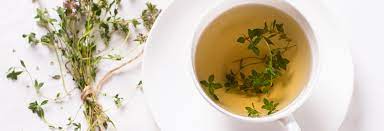Thyme is a robust, shrubby herb with trailing green-gray leaves and an intense aroma and flavor. This herb is native to the western Mediterranean, and it extends to drier, sunnier climates around Western Asia and southern Europe.
Although there are more than sixty types of thyme, Thymus vulgaris, or garden thyme, is the most common culinary species. It’s also the type most commonly used in historical recipes and remedies, especially in and around ancient Greece, Rome, and Egypt.
Thyme adds instant flavor to cooking, but it can also offer health benefits when consumed in fresh or dried form, or when it’s steeped to make tea.
Health Benefits
This fragrant herb provides more than just flavor to your favorite meals. In fact, thyme essential oil is known for its ability to fight off bacteria and fungus and has even been used to preserve food.
Thyme also contains a variety of minerals and vitamins that promote good health. Thyme is full of vitamin C for immune support, potassium for healthy cells, and manganese for bone development and blood clotting.
Eating thyme and drinking thyme tea can provide other health benefits such as:
Inflammation Reduction
Thymol, one of the main oils in thyme, can fight against cyclooxygenase-2, or COX-2, an enzyme responsible for inflammation in the body.
Another oil in thyme, carvacrol, has a similar effect on inflammatory cytokines, which are signals your body uses to increase inflammation. This oil can help reduce it.
Respiratory Support
Thyme is great for respiratory health as well, with some clinical studies showing its use in soothing coughs and relieving chest congestion. While fresh thyme is the most helpful for this, the essential thyme oils available in thyme tea may have some of these benefits, too.
Gastrointestinal Health
You can also take thyme to help with gastrointestinal issues. Thyme has antimicrobial properties, which help reduce germs in food and can improve your gut microbes and your overall intestinal health. This herb can also help increase appetite, support healthy liver function, and increase the protective gastric mucus layers in your stomach, which help protect the stomach lining from acid.
Nutrition
Thyme smells great, and it’s rich in vitamin C, vitamin A, and the B vitamins. A 100-gram serving of fresh thyme leaves provides 160 milligrams of vitamin C. A more reasonable 1-teaspoon serving offers 1.28 milligrams of vitamin C.
Things to Watch Out For
People who are allergic to thyme or similar plants like basil, oregano, sage, and lavender, may experience negative symptoms. These can include skin sensitivity if you touch thyme leaves or nausea, heartburn, diarrhea, and vomiting if you eat it or drink thyme tea.
Fresh and dried thyme is generally safe to eat or drink as a refreshing tea, but it is not interchangeable with thyme essential oil. Essential oils are highly concentrated and can be toxic in their undiluted form.
How to Prepare Thyme Tea
To enjoy the health benefits of thyme, you can easily prepare it as a tea. You can choose to make your tea using fresh leaves or ground thyme powder. You can also use dried thyme, but remember to strain the leaves from your drink to avoid unpleasant textures.
For fresh leaves, add several sprigs of thyme to a cup of boiling water and let steep for 5 to 8 minutes. If any leaves fall off the sprigs and into your water, you can strain them before drinking.
For powdered thyme, add about 1 teaspoon of the powder to a cup of boiling water and stir to combine. Ground thyme is similar in texture to matcha green tea powder, and you may need to stir several times to ensure thorough mixing.
Source: www.webmd.com









